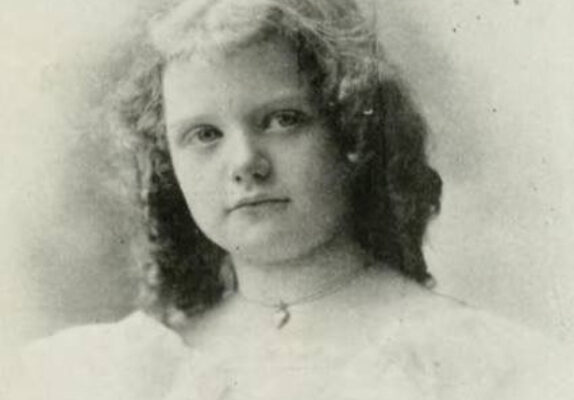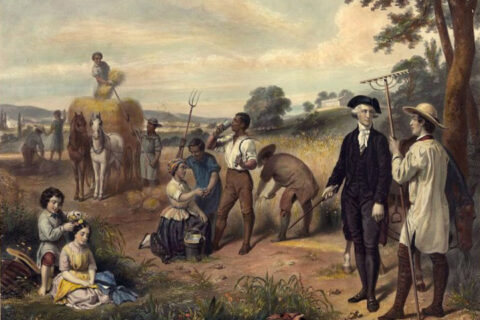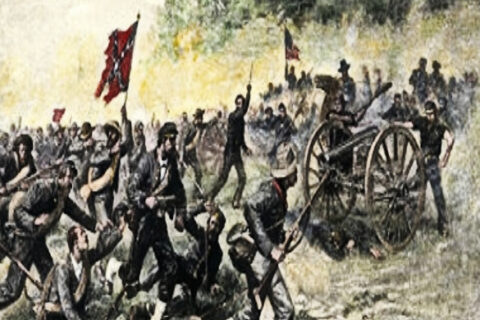Homeschooling, classical education, have been our best avenues. But constantly telling your children the truth feeds their natural rebellion against the institutions.
Father Dabney, Mar. 19, 2024
There is one point on which you insist too little, which is vital to the young citizens of the South. This is, that he shall not allow the dominant party to teach him a perverted history of the past contests. –
R. L. Dabney, The New South, 1882
Laura Talbot Galt was fully twelve years old before she ever saw a “normal school” classroom from the inside. Her education heretofore had consisted in studying the classics, as well as true histories about the WBTS, etc., from books contained in her maternal grandmother’s home library on the Ross family farm near Louisville, Kentucky, where the family lived.
Although a sweet, obedient child with a non-confrontational disposition by nature, these qualities in Laura’s character were put to the test at school when certain histories of the late war were presented by her teacher that conflicted with the histories of the same events she had read and internalized at home. The limit of her obedience was reached in her first year at school when her teacher, in Laura’s words, “tried to force the class to say that it was a breach of honor in Admiral Semmes to escape on the Deer Hound instead of giving his sword to Captain Winslow, when the Kearsarge had fired broadside after broadside into the Confederate cruiser after the white flag was raised.” Laura’s refusal to obey her teacher in this instance was her first act of rebellion at school, but it would not be her last, as we shall soon learn.
The next act of disobedience accredited to her name came the next school year, when her teacher instructed Laura to join in the singing of “Marching Through Georgia” with her classmates, and Laura, in turn, flatly refused. Indeed, not only did she refuse to sing along as told, but she went as far as to stop her ears with her fingers so as not to be forced to, again, in her own words, “listen to a song that declares such a tyrant and coward as Sherman and his disgraceful and horrible march through Georgia and the Carolinas to be glorious.” In further explanation of her little act of rebellion in this second and final case, Laura later wrote that, “I felt that forcing the Southern girls who were in the room to sing or listen to such a song was an insult that I could not stand.”
Laura was rewarded for her trouble in this second act by way of disciplinary action in the form of reprimand from the school. Whereupon her guardians at home lodged a formal complaint with the school’s superintendent, and removed her from the school forthwith.
Not long after the unfolding of the events just related, Laura’s story was picked up by and written about in the Atlanta Constitution, a copy of which item was sent to the editor at The Veteran shortly thereafter. The Veteran editor in turn initiated a correspondence with Laura’s family, suggesting to the members that they write down their own accounts and thoughts upon said events, and to submit them to the editor for possible future publication, should they choose to do so. Laura, her Aunt Edith, and her maternal grandmother, Mrs. Laura Talbot Ross, promptly answered Mr. Cunningham’s request, and it is from Laura’s published letter to the same that I extracted the quotes attributed to her (“in her own words”) both above and below.
You can readily imagine by now, dear reader, the large amount of attention and interest broad dissemination of Laura’s story in The Veteran and other publications generated, particularly among U.C.V., and chapters of the U.D.C. For her part, Laura could “find no words to express how extremely honored I feel when I look at my letters I have received from almost every State, and I think of what those dear old Confederates suffered for the cause they loved so dearly, and yet they praise me so highly for such a little act of duty.” “They do not know,” she wrote, “how much pleasure they have given me, for I will always keep their letters among my treasures.”
Perhaps her most cherished treasure that came of this was “when resolutions from John Pelham Camp, U.C.V., of Texas, came,” for, according to Aunt Edith’s account of the effect of its arrival to the home, “shouts of delight” instantly rang out. “It seemed,” wrote Edith, “from old friends sure enough,” adding in explanation that, “for many a time has she dashed around on her pony, a member of Pelham’s artillery.”
Nor would these form the whole of Laura’s growing collection of incoming treasures, for many more were to come in a variety of forms. Typical was her election as Honorary Member of the O. C. Blacknail Chapter of the United Daughters of the Confederacy, formally communicated to her by letter as follows:
This Chapter commends to the full your refusal to sing ‘Marching through Georgia.’ There was patriotism of the highest type and wisdom beyond your years in the stand you took. This song glorifies the most brutal deeds in American, we might say in Anglo-Saxon history. It glorifies the devastation of an area of Southern territory larger than some of the Northern States; it glorifies the wanton and utter destruction of thousands of peaceful Southern homes; it glorifies the ruin and beggaring of tens of thousands of innocent and defenseless Southern women and children. Worse even than all this, it glorifies crimes against Southern womanhood too dark to confide to any keeping save oblivion. To sing it in the presence of a Southern woman is worse than dancing on the grave of her mother. Than this song, nothing can more tend to perpetuate sectional strife and hatred. All just and patriotic people, North as well as South – all who would let the dead past of hatred bury its own dead – owe you a debt of gratitude. In token of our debt to you, you have this day, by unanimous voice, been elected an honorary member of this Chapter for life, and we pray that your entire life may only be on a level with that high and noble stand you took in the cause of peace and patriotism.
In addition to numerous honors bestowed upon our heroine of the above kind, there were others ceremoniously presented to her person of the kind depicted in this image:

In reading Laura’s story in the 1902 Veteran, I was inspired by her “little act of duty” to perform one of my own in her honor, and in dedication to her blessed memory. Namely, to re-write and re-name “Marching Through Georgia” in language expressive of the true infamy of that march and its marchers, and the dark shadow of disgrace it shall ever cast upon the Yankee nation. Which I include in closing below the fold for your benefit as well, dear reader.
Rest in peace, Laura Talbot Galt, and may God bless the memories of our beloved ancestors you defended so fearlessly and with such grace!
Trampling on Georgia, by T. Morris
Bring the bloody bugle, boys,
We’ll hiss another tune;
Hiss it in the spirit that shall
Usher freedom’s doom;
Hiss it as we used to hiss it,
Heaping utter ruin;
While we were Trampling on Georgia.
Chorus:
“Hurrah! Hurrah! Let conflagration be!
Hurrah! Hurrah! The rag we hoist in glee!”
So we hissed our treason from Atlanta to the Sea,
While we were Trampling on Georgia.
How the negroes cowered when
They heard our awful sound;
How the beasts all vanished,
Scarce one living to be found;
How the sweet potatoes even
Rotted in the ground;
While we were Trampling on Georgia.
(Chorus)
Yes, and there were Unionists
Who wept for what they saw;
To see the flag they’d loved so dear
Brought forth to lead it all;
Hardly could they self-contain
In witnessing the gall;
While we were Trampling on Georgia.
(Chorus)
“Sherman’s mercenary boys,
We’ll plunder to the coast!
We’ll ravage rebel women too,” we said,
And ’twas a truthful boast;
Had we moral fortitude,
We’d’ve reckoned with our host;
While we were Trampling on Georgia.
(Chorus)
So we made a thoroughfare
For tyr’nny and her throng;
Sixty miles in latitude,
Three hundred to the long;
Treach’ry was our guiding light,
And such inspired our song;
While we were trampling on Georgia.
Hurrah! Hurrah! Let conflagration be!
Hurrah! Hurrah! The rag we hoist in glee!”
So we hissed our treason from Atlanta to the Sea,
While we were Trampling on Georgia
There was a little Southern Lass
Brought honor to her name;
She closed her lips and stopped her ears,
These acts to bring her fame;
“Obey the fifth command,” she said,
Should teacher intervene,
“Marching Through Georgia I shall not dare to sing”
Hurrah! Hurrah! For li’l Miss Laura Galt!
Hurrah! Hurrah! With her there be no fault!
Alarm she sounded far and wide ‘twas told in ev’ry camp;
“This thing they do to us in school to darken ev’ry lamp!”
Hurrah! Hurrah! For li’l Miss Laura Galt!
Hurrah! Hurrah! With her there be no fault!
Alarm she sounded far and wide ‘twas told in ev’ry camp;
“This thing they do to us in school to darken ev’ry lamp!”







An inspiring example to be sure. (I thought of Emma Sansom in reading of Laura). It’s critically important that young Southern girls be inspired with heroic examples like this in our age of celebrity, where Taylor Swift and the Kardashians are being offered as their role models. May the words of Coventry Patmore never become true in the South:
‘Magna Est Veritas’
Here, in this little Bay,
Full of tumultuous life and great repose,
Where, twice a day,
The purposeless, gay ocean comes and goes,
Under high cliffs, and far from the huge town,
I sit me down.
For want of me the world’s course will not fail:
When all its work is done, the lie shall rot;
The truth is great, and shall prevail,
When none cares whether it prevail or not.
A very close relative of mine who has a brood of young children he and their mother are raising and educating at home would heartily agree with you, sir. Indeed, recently he called with the purpose in mind of selling me on a new idea of his. Namely, that I write a series of relatively short children’s stories introducing his kids and their cousins to interesting young Southerners like miss Galt et al and their heroic deeds. Needless to say, he barely broke into his “sales pitch” before I saw the potential value of such a project, and instantly agreed to give it go. With the recent inclement weather having essentially shut my business down temporarily, I have already been able to complete two of the stories, written in the style of first person stream of consciousness. There are more (many more, I hope) forthcoming that will be written in that style and others. Somewhere down the road we’d like to collect the stories into a book of inspiring children’s stories for Southern girls and boys potentially disseminated more broadly.
Emma Sansom’s story will definitely be included in the collection, in part because my 3rd great-grandfather, James H. Morris, and his siblings then too young to enlist in Confederate service, lost their mother very close in time (1863-4) and place (Blount Co.) to that raid, in the absence of their father and two elder brothers, Confederates with the 19th Alabama Infantry Regiment…
Thanks for the positive feedback, as always, sir.
Sherman said something like the following about himself: “Based on what we learned [at West Point] what we are doing here (in Georgia) is a war crime.”
Sherman was a complicated man. Still, whatever else he may have been, he wasn’t a coward. He was wounded in battle numerous times.
He justified his army’s depradations in Georgia with the excuse that it would shorten the war and thus save lives in the end.
Perhaps he was correct. But the Southerners who saw their stocks plundered and their homes and world go up in flames, in the middle of winter, by laughing, hooting Northern bummers would no doubt disagree.
This neurotic country still suffers PTSD from the Civil War.
You’ll have to forgive the 13 year-old Laura for speaking as a 13 year-old, mis-applying certain adjectives in describing what Sherman was. She likely would not have said he was a coward in, say, the 1940s when she was a grown woman in her fifties. Albeit she might still have maintained that his acts were *cowardly*, and rightly so, since he performed them against helpless women and children militarily unopposed.
I don’t need to have seen or experienced it first-hand for thoughts of it to make my blood boil. If that is what you diagnose as neurosis and post-traumatic stress, I stand guilty as charged.
Thanks for the comment.
You’re welcome. And thanks for remembering brave little Laura Galt to us.
I’m reading a revealing book right now called ‘Advance to Barbarism’ by F.J.P. Veale. He mentions Sherman (and Sheridan) and points out that “civilized warfare” was a Western European anomaly in the history of warfare that only lasted for about 200 years. He points out that the North and its generals employed ‘total war’ (under orders from the Lincoln administration) because they were accustomed to fighting American Indians. Sheridan in 1870 even visited with Bismarck and complimented him on his ability to ‘hit’ an enemy, but said he needed to learn to ‘annihilate’ him. Bismarck was having none of it, and won the Franco-Prussian War while adhering to civilized warfare. He points out that the South was culturally European, and its professional soldiers (preeminently Lee) were in complete accord with the European ideals of civilized warfare.
“He justified his army’s depredations in Georgia with the excuse that it would shorten the war and thus save lives in the end.”
It’s interesting how that rationale keeps cropping up throughout history when it’s not true. The phosphorous-bombing of German cities in WW2 (Lindemann Plan) was supposed to break the morale of the German people and shorten the war. It didn’t. The atomic bombing of the Japanese cities is also always cited as having shortened the war and “saved” lives. Not many know that the war in the Pacific was already won and the Japanese were suing for terms, but the Allies just had to try their new toy to atomize defenseless people before accepting their insisted upon unconditional surrender.
I am guessing the date of Laura’s heroic stand was at about this time.
From the book ‘The hundred years’ by Guedalla. Chapter 1881 subtitle Buffalo N..Y.
‘ Born on an upcountry farm, he gravitated to the city, served a short term on an office stool, saved a little money, and invested it in a small produce business. It prospered, since a propitious combination of Mr. Rockefeller’s youthful energy with the demands of the union armies in the Civil War for increasing quantities of produce maintained its profits’ p.156
‘It was an age of vast collective enterprise, unfriendly to obstruction by individuals and prolific of huge economic organisms, of which standard oil was the most highly developed. The age of lincoln had departed; and in the less heroic age of Hayes and Garfield national leadership in effective enterprise passed from the White house to Wall street, ……p.160.
Laura was reprimanded for not singing the praises of that war criminal sherman?!
Thank you for bringing that to my attention Mr. Morris, the Lahaina Maui fire has cancelled millions, I’m guessing, fire insurance policies across the state of Hawaii, forcing a lot of people to sell their property, especially if they have a mortgage on it.
It’s gone with the wind with the L.A fires right now too! Sherman in real time!
God Bless that daughter of the Confederacy, and God Bless you Mr
Morris for sharing that.
The victims of Helene in East Tennessee and Western North Carolina are in the same boat, but their situation (which remains dire) seems to have taken a distant second place to the more immediate situation in CA.
Since he is better at getting to the bottom of such things than I tend to be, I would like it if ol’ Shackelford would tackle Trump’s recent accusations against Biden, wherein he is accusing him of selling hundreds of miles of unconstructed border wall materials purchased during his (Trump’s) previous term, to monied interests for pennies on the dollar, who are, in turn, offering it back for sale to Trump at current “going rates.” I don’t know how much truth there is to Trump’s story, but to whatever extent it is true, you can bet the “monied interests” involved are of a kind who worship in Satan’s synagogues on Saturdays.
Thanks for the comment and positive feedback, sir; it was my pleasure to share Laura’s story with loyal ID readers like yourself.
Thank you Sir, my family has donated upwards of 500 hand and body warmer packets to the residents of western N.C.,it’s not much in the grand scheme of things but with the addage of, one day at a time, I’m comforted knowing that a few Southern Souls may find relief getting through the cold winter nights.
God Save the South!
Outside Looking In: I should let you know that there is a broader context surrounding Laura’s “little act of duty” that I plan to write about in the relatively near future as well. Her story deserved its own telling aside from mention of that context because she was one of a very few who had the courage to buck the trend in the face of threats of punishment. This is also why she got so much positive attention and feedback from ex-Confederates and their sons and daughters everywhere; they knew which way the winds were blowing, they were living it after all. But many of them had also become complacent about the trends in their old ages. Her little act served to re-invigorate more than a few of them to buck the trends at every turn as well. But like I said, I’ll spell all of that out in more detail in a future article.
God bless you and your family, sir!